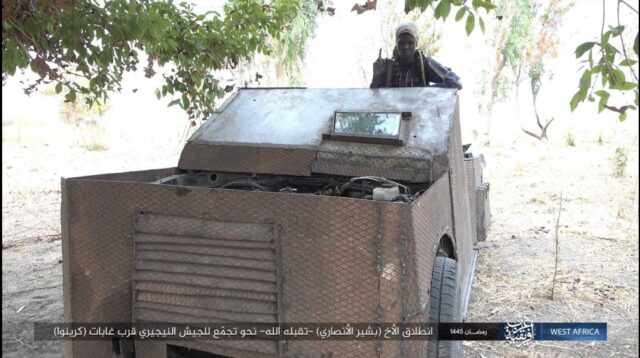
Brief: ISWAP Suicide Truck Bombers Target Nigerian Supercamps in Northeast
Publication: Terrorism Monitor Volume: 22 Issue: 6
By:

Executive Summary
- Islamic State in West Africa Province (ISWAP) aims to break its ongoing stalemate with Nigerian forces by deploying suicide vehicle-borne improvised explosive devices (SVBIEDs).
- This represents the first time in five years that ISWAP has used SVBIEDs, with at least four bombings occurring since February 2024.
It has been more than five years since Islamic State in West Africa Province (ISWAP) first showcased suicide vehicle-borne improvised explosive device (SVBIED) attacks on Nigerian soldiers in the July 2018 propaganda video “Tribulations and Blessings” (Telegram/@Al-Haqaiq, July 11, 2018). The use of SVBIED attacks by ISWAP’s parent group, Islamic State (IS), has been notable since at least 2015, when IS captured sport-utility vehicles and began armoring them with scraps of other destroyed vehicles and tanks. Subsequently, ideologically motivated suicide bombers could drive the vehicles into enemy fortifications and divert the attention of opposing soldiers toward themselves and away from other fighters (Middle East Institute, April 2019).
The spread of this innovative tactic from Syria to Nigeria was emblematic of the transfer of knowledge from more experienced jihadists in Syria and Iraq to their West African affiliates. ISWAP fighters, like their Syrian and Iraqi counterparts, use SVBIEDs to attack Nigerian military fortifications. By 2020, ISWAP’s SVBIEDs contributed to the group’s ability to overwhelm Nigerian army outposts in the group’s main operational areas in Borno State. As a result, the Nigerian army abandoned its most far-flung—and often ramshackle—outposts in remote areas. Instead, government forces consolidated in heavily fortified “supercamps.” These protected the larger urban centers, offering sites where the army, internally displaced people (IDP), humanitarian workers, and civilian population could live and work in relative safety (PM News [Nigeria], September 27, 2020).
The Nigerian government’s supercamp strategy has created a stalemate in Borno State. On the one hand, ISWAP cannot penetrate the army’s supercamps, but on the other, the Nigerian military is unable to eradicate ISWAP’s rural hideouts for fear of ambushes (politique étrangère, August 17, 2023). A new surge of SVBIED attacks suggests that ISWAP may be launching a new offensive that aims to break the stalemate by weakening the Nigerian army and breaking through the supercamp fortifications. After a years-long lull in SVBIED attacks, since February, ISWAP’s SVBIEDs in Borno have been deployed in:
- Gashkar, against Multinational Joint Task Force (MNJTF) soldiers, on March 13;
- Kirenawa, against Nigerian soldiers, on March 11;
- Alagorno Forest, against Nigerian soldiers, on February 28; and
- Banki, although the vehicle was captured by Nigerian and Cameroonian soldiers near the border before detonation on February 10 (X/@HKamaan, March 21).
It is likely that IS and its “external provinces” have been reinvigorated in recent months by the actions taken by groups like ISWAP and Islamic State in Khorasan Province (ISKP) in Afghanistan. IS may have accepted that since its “core” in Syria and Iraq is unlikely to be reconstituted anytime soon, provinces like ISKP and ISWAP must go on the offensive. In ISKP’s case, this has involved operations in Afghanistan, Pakistan, and most recently in Russia, although several of these plots have been foiled (see EDM, March 27; Times of Israel, December 31, 2023). For ISWAP, this may involve both attacks into the more government-aligned south, as well as reconquering Borno State’s urban areas through the use of SVBIEDs (Sahara Reporters, September 22, 2023).



